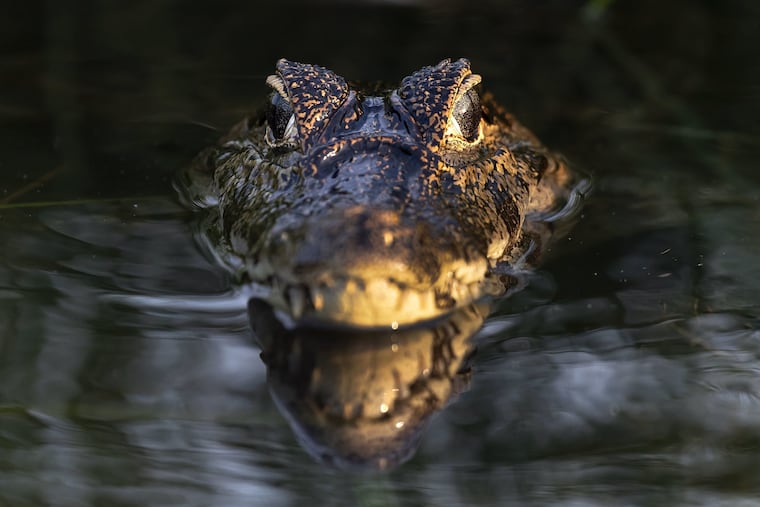Cayman, the caiman found in FDR Park, was euthanized after animal sanctuaries wouldn’t take him
The Pennsylvania Fish and Boat Commission said they couldn't find a sanctuary for the reptile before putting him down.

RIP, Cayman, who is hopefully snapping all the fish he could ever want in the afterlife.
The 3-foot-long caiman found roaming FDR Park earlier this month was euthanized by state officials, Pennsylvania Fish and Boat Commission spokesperson Mike Parker confirmed.
First reported by Axios, the euthanizing occurred after officials couldn’t find an animal sanctuary to house the alligator-adjacent reptile, Parker said. He would not say when Cayman was euthanized or how many animal sanctuaries rejected the animal.
“The PFBC is not a rescue organization for exotic animals and unwanted pets,” said Parker over email. “These animals are not easily adopted or cared for, and often require large spaces and financial investment that most rescue organizations do not have.”
Parker said the commission itself “does not have the capacity to house or care for large, exotic reptiles.” In instances where the agency cannot find a suitable home for an animal, euthanizing is an option.
After someone in FDR Park called Philadelphia police about an alligator sighting, Cayman (who got the name from officials) was taken to ACCT Philly, the city’s only animal care and control group, where staff cared for the caiman until the commission took over.
» READ MORE: A 3-foot caiman has been removed from FDR Park
ACCT Philly executive director Sarah Barnett said she was puzzled by the decision to euthanize Cayman. She said she believed state officials were taking the reptile to an undisclosed animal rehab facility in northeast Pennsylvania. Parker said the Pennsylvania Game Commission collected the caiman from ACCT Philly on behalf of Fish and Boat, but he could not comment on how Barnett got the impression there was a rehoming plan.
Texts reviewed by The Inquirer show an ACCT employee asked a Fish and Boat representative what would happen after it took possession of the caiman.
“We have a reptile rehab in NE pa. If they can take him,” responded the Fish and Boat employee.
“When [state officials] reached out to get him, we assumed they found placement,” Barnett told The Inquirer.
She chalked the incident up to a misunderstanding and does not believe anyone intended to cause harm, but she would not have relinquished Cayman if she knew the likelihood of him being put down.
“I don’t understand why you would waste the resources to transport an animal just to euthanize it,” Barnett said. “If everyone felt that [euthanizing] was necessary, we could’ve taken care of that here.”
When ACCT acquired the caiman, Barnett said, staff anticipated that state officials might not be able to assist, so they began considering alternate rehoming options, such as the Philadelphia Zoo or reptile refuges elsewhere in the United States.
“He would’ve been OK here for a week or two,” Barnett said.
Caimans are not native to Pennsylvania and could turn to hunting small dogs when out of their element.
Barnett and Parker believe the reptile was likely released by an owner who was no longer able to care for it, which is common when animals are procured via the exotic animal trade. ACCT Philly takes in about 1,000 animals that aren’t cats or dogs per year, Barnett previously told The Inquirer, which can include anything from rabbits and raccoons to iguanas and pythons.
“If you have an animal you can no longer keep, including caimans or any other animal that is extremely difficult to humanely house, please reach out to us instead of just letting them go,” ACCT Philly posted on Facebook earlier this month.
Pennsylvania law allows for the sale and ownership of caimans, alligators, and crocodiles, so long as they aren’t released into the wild. It is illegal to release nonnative species into the state’s natural environment, which can result in fines or jail time
Parker confirmed the caiman’s release is part of an ongoing investigation, but he did not identify the deceased reptile’s former owner.